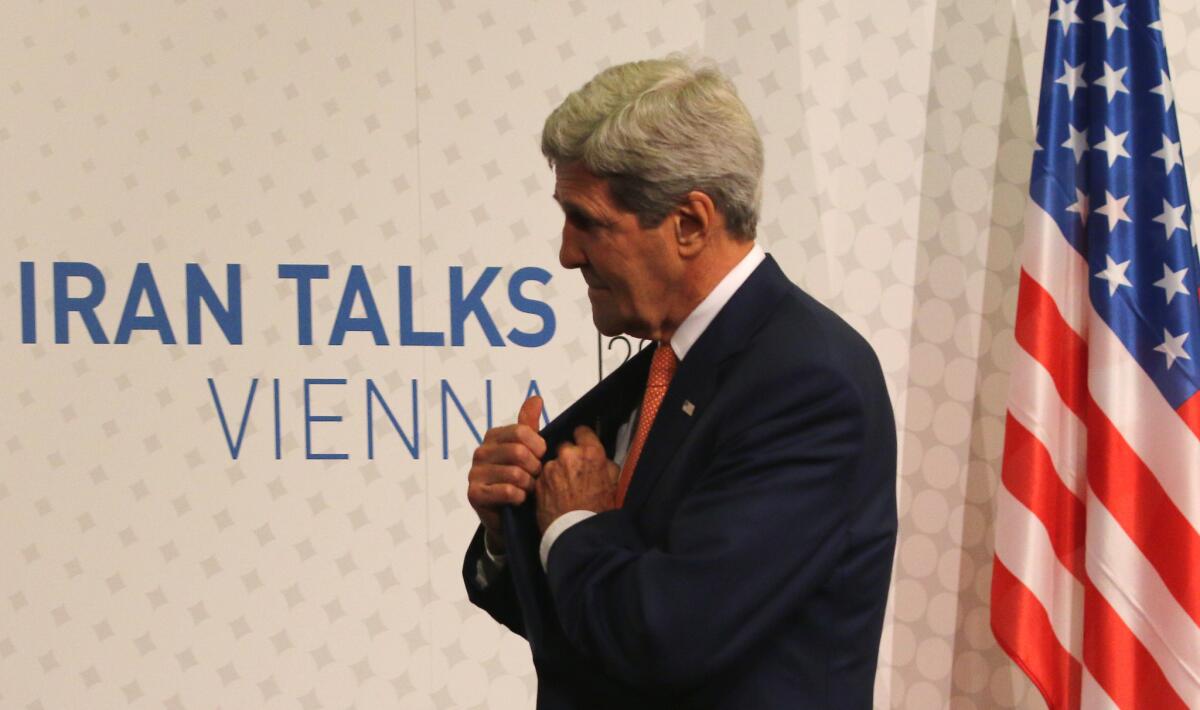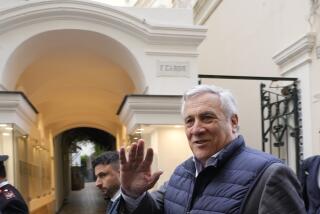Iranians join Kerry in hinting that nuclear talks may be extended

The Obama administration and Iran signaled Tuesday that they were prepared to extend international negotiations over the latter’s nuclear program beyond the Sunday deadline, buying time for the struggling effort but leaving its future cloudy.
After two days of face-to-face meetings with the Iranians, Secretary of State John F. Kerry said the seven-country meetings had made substantial progress and made clear his desire to continue the effort if there was no breakthrough by the weekend.
Though “real gaps remain,” he told a news conference, “we’ve made real progress, and both [sides] see ways in which we can make further progress.”
Three hours later, Iranian Foreign Minister Mohammad Javad Zarif was more explicit, saying at another news conference that he believed an extension was warranted.
“We have made enough headway to be able to tell our bosses back home, all of them, that this is a process worth continuing,” he said. “This is my recommendation and I’m sure Secretary Kerry will make the same recommendation.”
Zarif and Kerry said negotiators wouldn’t made a final decision on an extension until the weekend.
Iran and the six world powers — Britain, China, France, Germany, Russia and the United States — are seeking a deal that would lift the tough international sanctions on Iran’s economy in exchange for limits intended to keep Tehran from gaining a nuclear weapons capability.
Diplomats say they have made progress toward resolving key issues. On Monday, Iranian officials disclosed that they had floated a proposal that would address the core dispute: the Western demand that Iran scale back its uranium enrichment infrastructure until it is only a “fraction” of its current size.
Iran disclosed that it had proposed to cap its operating centrifuges at the current 9,400 during the duration of a deal. That is still more enrichment capacity than the international community wants, and it would leave Iran poised to quickly expand enrichment.
One diplomat, who requested anonymity because of the sensitivity of the talks, said the Iranian proposal was “unworkable in its present form.” But the diplomat, and others, said the proposal showed a new flexibility that they hoped could lead to further concessions by Iran.
Still, as Kerry and other officials made clear, there remains a large gulf between the two sides, especially on the issue of enrichment.
As Iran’s Supreme Leader, Ayatollah Ali Khameini, made clear in a speech July 7, Iran is only willing to accept a deal that satisfies two significant goals: a removal of sanctions and preservation of its $100-billion nuclear program. Iran wants to ramp up the program to industrial scale after the end of the deal, a move U.S. officials say is unnecessary for power generation.
Kerry’s readiness for an extension marks a shift for the U.S. side. Last week, when the Obama administration hoped for a quick deal, a senior American official said Washington might not agree to extend talks unless Iran gave substantial ground.
But neither Iran nor the administration wants to end the diplomacy. That could allow Iran to resume its nuclear efforts, enabling it to gain a weapons capability if it so chose — and risk airstrikes by Israel or some other party to prevent that from happening.
It would also mean abandoning diplomacy that the White House has hoped would be its greatest foreign policy achievement.
The Iranian government also has heavy bets on a deal. An easing of the sanctions has been a top priority of the administration of President Hassan Rouhani, and some analysts believe he would become a lame duck if the deal-making dies.
The path to an extension may be strewn with obstacles. Congressional critics of the negotiations contend that Iran doesn’t genuinely want a deal, and they may seek to block an extension.
Rep. Ed Royce (R-Fullerton), chairman of the House Foreign Affairs Committee, said Tuesday that in light of Khamenei’s hard line, he wanted to discuss with the administration the imposition of new sanctions on Iran, a move that could undermine the talks.
Still, some lawmakers insist the administration’s supporters can probably fend off such attempts to add new sanctions, though it would become more difficult if Republicans win control of the Senate in November.
Iran could also, as part of the extension, demand a further sweetening of the terms of an interim nuclear agreement signed last November. Negotiating an extension could be complicated and politically charged, especially if the two sides are seeking an extension of many months.
Though Kerry and Zarif said there remained a chance of a deal by Sunday, it was unclear whether the meetings would be even well-attended enough to produce the long-awaited breakthrough. Some key officials are taking off several days this week.
Kerry said he was returning to Washington to discuss the issue with Obama and lawmakers. He said he didn’t plan to return to Vienna this weekend, unless urged to by other officials.
Zarif said he was optimistic about the deal-making because he detected a new eagerness on the Western side.
“I sense a readiness to listen in the meetings that have happened in the last three days,” he said.
For foreign policy news, follow @richtpau on Twitter
More to Read
Start your day right
Sign up for Essential California for news, features and recommendations from the L.A. Times and beyond in your inbox six days a week.
You may occasionally receive promotional content from the Los Angeles Times.







